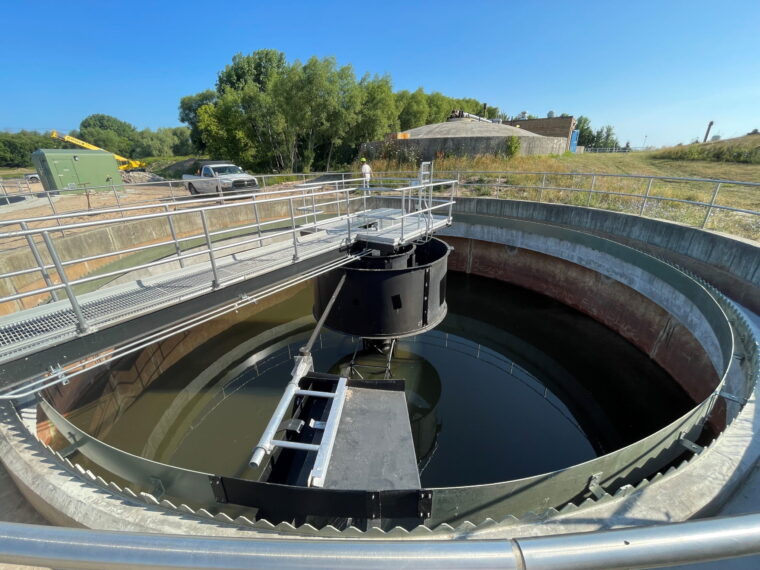
As part of its efforts to upgrade water infrastructure, ensure healthy drinking water and protect the environment, officials in Michigan have awarded $91.4 million in grants to communities statewide.
The grants are administered by the Michigan Clean Water Plan, which has awarded more than $4 billion since January 2019 to upgrade drinking water, stormwater and wastewater facilities across the state. The funds come from multiple Environmental Protection Agency programs, such as the Drinking Water State Revolving Fund (DWSRF), the Clean Water State Revolving Fund (CWSRF), the Emerging Contaminants in Small or Disadvantaged Communities Grant Program (EC-SDC) and funding from the American Rescue Plan Act (ARPA.
Michigan’s Department of Environment, Great Lakes, and Energy (EGLE) passed those federal funds to 17 communities, many of which have federal consent orders to upgrade their water infrastructure and get rid of old pipes that leach lead and other chemicals into their water systems.
“Ensuring healthy drinking water and safeguarding our Great Lakes and streams is an all-hands-on-deck effort,” EGLE Director Phil Roos said in a press release. “This $91.4 million will help 20 communities accelerate critical projects like lead service line replacements and sewer system rehabilitations.”
Nearly 80% of Michiganders are served by a community wastewater system, and a similar percentage by a community water system. These systems often have trouble finding resources to address legacy issues such as aging drinking water and stormwater facilities as well as emerging challenges such as the new standards for Per- and Polyfluoroalkyl Substances (PFAS) or “forever chemicals,” the EGLE said in a release.
The city of Benton Harbor received the largest grant at $19.57 million to replace a gravity sanitary sewer along multiple streets. The project also includes upgrades at eight sanitary lift stations, televising a gravity sewer via CCTV, and compiling data gathered into Benton Harbor’s geographic information system map.
The city of Ecorse received $7.57 million to replace its water system and 10,000 linear feet of existing water main in areas where there are frequent breaks and low pressure. Ecorse’s water mains will be upsized from 6-inch mains to 8-inch ductile iron mains, and an existing 12-inch main will be replaced. As part of the city’s water main replacement project, 135 lead or galvanized service lines will be replaced with copper mains.
The town of Union received a $10.98 million grant to build a Type 1 production well, to expand and improve the Isabella water treatment facility with one iron removal filter and a high-service pump room equipped with two pumps, new chemical feed, mechanical piping and other accessories. The township will also use the funding to replace 60 lead service lines.
The town of Grayling received $3.61 million to complete the remaining financing of its $25 million project to upgrade its water system. The township also received $21.44 million through the ED-SDC to remediate wells in the municipality because Aqueous Firefighting Foam (AFFF) was used and stored over the past several decades at the 923-acre Grayling Army Airfield.
The city of Melvindale was awarded $4.16 million to rehabilitate a pump station, build a wet weather storage tank, and televise a sanitary sewer. Melvindale will use funds to clean and televise 35,000 linear feet of the city’s sewer system to help identify areas that need repair or new lining.
Additionally, 11 water systems received grants to verify service lines at properties where lead is suspected but not confirmed or where line material is unknown but likely contains lead.
This process involves hydrovacing both sides of each curb stop and documenting service line materials inside the building. Hydrovacing involves a piece of equipment that uses high-pressure water to cut and liquefy the soil, while simultaneously using high-volume vacuum to remove the soil from the excavation, according to EGLE ‘s release.
The 11 cities that received grants are:
City of Portland, $256,500
City of Caseville, $143,998
New Buffalo Township, $106,000
City of Davison, $104,951
Au Sable Charter Township, $107,100
Village of Benzonia, $84,000
Village of Mattawan, $87,000
City of Coloma, 198,000
City of Saugatuck, $221,600
Village of South Range, $187,650
City of Adrian, $510,000
The following cities received funding through ARPA:
The city of Traverse City received $2 million to remove and replace 200 lead service lines.
The Downriver Utility Wastewater Authority got $10 million to replace an aging ultraviolet (UV) disinfection system that is at the end of its useful life and is no longer serviced by the original manufacturer.
The Genesee County Drain Commissioner Division of Water and Waste Services received $10 million to construct digesters at the Anthony Ragnone Wastewater Treatment Plant (ARTP) in Montrose, Michigan. The digesters will reduce the volume of biosolid waste and create renewable energy in the form of natural gas. The funds will also be used to build three Combined Heat and Power (CHP) generators to produce electricity and heat that can be used at the ARTP and to purchase biogas cleaning and conditioning equipment.
Photo courtesy of the state of Michigan
The post Michigan allocates $91 million statewide for water infrastructure upgrades appeared first on Government Market News.
